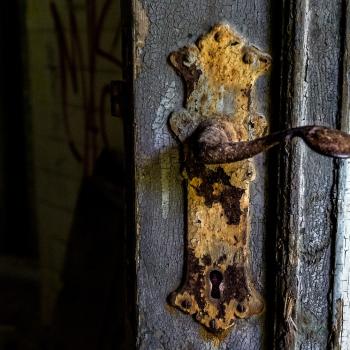Less than forty-eight hours ago, I walked and stood and wound my way through a neighborhood in Minneapolis, Minnesota. This was not just any neighborhood, mind you, but the neighborhood where uprisings started four years ago – where a man named George Floyd became a household name, where protests that began in an historically Black neighborhood called Powderhorn Park became part of 2020’s cry heard round the world.

The short pilgrimage I embarked on was nothing short of impactful, to say the least, but before our group set out to walk through a neighborhood dotted with the grittiness of urban living, emboldened by art that told a sacred story of remembrance and hope, our guides – who were from the Powderhorn Park neighborhood themselves – encouraged us to lean into three questions.
Do you hear us? Do you see us? Do you feel us?
These were the questions the youth who’d marched and shouted and whispered in the dark asked four years ago. In the same way, they too encouraged us to hear and see and feel – to lean into a visceral embodiment that woke up so many of us, that changed so many of us, I think I hope, four years ago now.
I was reminded of these questions when I sat with today’s Gospel reading. In Mark 8, Jesus is heading with his disciples to the villages of Caesarea Philippi. It’s here that he asks the first of two questions: Who do people say that I am?
The disciples, perhaps not knowing any better, speak truth, or at least some part of it. “Some say you’re John the Baptist, and others, Elijah; and still others, one of the prophets.” It’s not hard to imagine how other potential answers about the man named Jesus may have come into play in that moment as well, even if the writer Mark neglected to record them.
As one writer speculates, it’s not hard to imagine them also adding in a rumor or two: “Some people say you’re a fraud. A heretic. A demon. A madman.” “Some people say you’re Mary’s illegitimate kid.” “Some folks think you’re a traitor to Rome.” “Actually, a lot of people don’t care who you are – they just don’t like you” (here).
Sometimes it’s not so hard to imagine what other people think about Jesus when so many of us are surrounded by people who hold plenty of thoughts about Jesus.
Even so, Jesus doesn’t stop there, but he asks the question again, this time with the twist of a single word: “But who do you say that I am?” No longer is he asking or imagining what the people outside of these walls think about him, but he’s wondering what those who’ve walked with him and talked with him, all these days and months and maybe even years now, think about him.
As luck would have it, Peter is the one to answer – which perhaps comes as no surprise because Peter is often the first to answer.
If you don’t know who Peter is, Peter is like the kid who shows up for Vacation Bible School during the summer and never leaves. He just can’t get enough of the people and the place and the God, because he is all in. He’s like hands in the air, wave ‘em around like we just don’t care, sold out for Jesus, even though he doesn’t really know the prayers and he hasn’t exactly figured out how to cross himself – even though he shouts out “Amen!” at all the wrong times, because this is an Episcopal house of worship, remember, and doesn’t really know who this Jesus guy is because he’s still getting to know this Jesus guy for the first time.
So when Jesus asks him, “Who do you say that I am?” Peter quickly answers, “You are the Messiah.” This seems like an absolutely appropriate answer, but Jesus sternly orders the men not say another word about it – not to tell anyone about him.

This, of course, doesn’t make any sense at all. Wasn’t that exactly what Peter was supposed to say and do in that moment, in that response? Didn’t he give the correct answer and say the right thing?
But God is not a God who always works and acts according to our whims. Sometimes God is a God who invites us seek Mystery, to lean in and hear and see and feel.
Because, what do you see right now? What do you hear right now? What do you feel, deep down inside you, right now?
In Mark 8, the story, once again, takes a turn: Just as Jesus tells them not to tell a soul, he also lets them in on a not-so-little secret – that someday soon and very soon now, he is going to “undergo great suffering, and be rejected by the elders, the chief priests, and the scribes, and be killed, and after three days rise again.”
Although Jesus is quite open about the matter, Peter pulls him aside and begins to rebuke him. Now, I don’t know about you, but I’m not a fan of the word “rebuke,” I suppose from my days when this word was used in different conservative contexts to correct me when I wasn’t getting right the image of God – when I had strayed from what I was supposed to do as a Christian, according to the gatekeepers of this singular vision of faith.
Because to rebuke means to “express sharp disapproval or criticism of someone because of their behavior or actions.” So when Peter pulls Jesus aside, it is to tell him that he disapproves of this whole idea that he’s going to suffer and be rejected and die. Peter doesn’t like that idea; he doesn’t approve of that idea, because who would? Who does, if we’re honest?
But it’s then that the rebuking comes full-circle: Jesus turns around and rebukes Peter, because Peter’s not thinking about the things of God. Peter’s thinking about the things of humans.
As I think about this story, I think about the Peter present in all of us. If posed with the question, “Who do you say that I am?” I imagine many of us would have uttered the right answer. Well, Jesus, you’re the Christ. The Son of God. The Messiah. The one who takes away the sin of the world – I mean, isn’t that right? But as writer Debie Thomas asks, when it comes to answering this question, “Do I have my own agenda when it comes to what Messiah-ship means? An agenda shaped around my own comfort? My own lifestyle? My own priorities and preferences? Do I look away in embarrassment when God challenges that agenda?”
Funny how these questions now feel particularly relevant when it comes to the current political climate or even to the opening story the preacher lady told at the start of her sermon.
And we don’t like to feel uncomfortable, certainly not in church. We don’t want to be challenged, not by the man whose body remember every Sunday morning when we gather to eat the bread and drink the wine.
But what if Jesus is sometimes in the business of discomfort and challenge? What if Jesus is just as present in neighborhoods made real by graffiti and street art, poverty and violence, just as just as he is present in neighborhoods dotted with white picket fences and private security guards?
What if this same Jesus, no matter where we are or who we are, begs us answer the question, Who do you say that I am? Just as he invites us to hear and see and feel his presence all around us.
What if, what if, what if? Might Jesus find you as you seek Mystery this week.
Amen.
—
This is a sermon preached on September 15, 2024 at St. Paul’s Episcopal Church in San Rafael, California. If you like this post, you might also like “The Blessing of the Doubter, in You and in Me.” In the meantime, seek Mystery.













